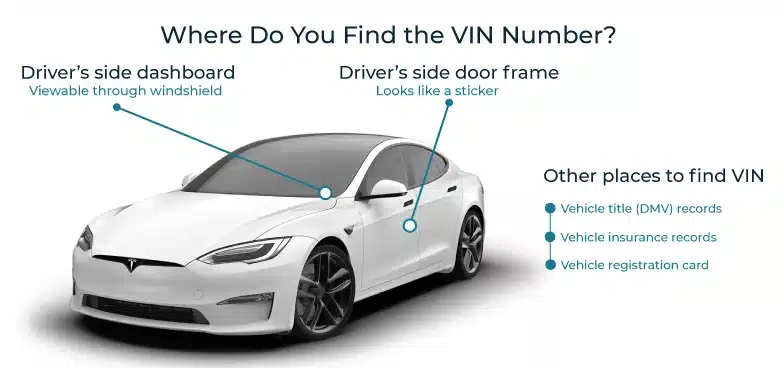
GEO Recall Check
Enter your GEO’s VIN and let Detailed Vehicle History do the heavy lifting. In seconds, see safety defects, repair status, and the next steps to claim free dealer fixes. Stay safe, stay compliant, and keep your GEO’s value strong.
What is a GEO Recall?
GEO was a small-car offshoot sold by General Motors (GM) and folded into Chevrolet after the 1997 model year, so by 1998 the Metro, Prizm, and Tracker wore Chevy badges. That history matters because GM/Chevrolet dealers handle GEO safety recalls today.
A GEO recall is an official safety fix issued by the manufacturer or the National Highway Traffic Safety Administration (NHTSA) when a defect or standard violation could lead to crashes, fires, or injuries.
Repairs are free when the vehicle was first purchased within 15 years of the recall notice; beyond that window, a free remedy isn’t guaranteed and may be goodwill. NHTSA’s VIN tool also focuses on unrepaired safety recalls from the last 15 years.
For older campaigns or short/vintage VINs, run Detailed Vehicle History’s GEO recall check. We can decode non-17-character VINs and surface recall records across sources, so you know exactly what to do next.
Why You Should Check the GEO Recall History?
The purpose of running a GEO recall check is to identify any safety issues or defects that may exist in a used GEO vehicle. This is important because it allows potential buyers to make an informed decision about whether or not to purchase the vehicle.
Recalls are issued when a manufacturer determines that a defect in a vehicle poses a safety risk to drivers or passengers, and it is crucial to address these issues promptly to avoid potential accidents or injuries. By running a GEO recall check, buyers can ensure that they are purchasing a safe and reliable vehicle.
Below are some extra reasons why you should check the recall:
Avoid Unsafe Classics GEO
Older cars can hide old defects. A quick GEO recall check tells you if your Metro, Prizm, Tracker, Storm, or Spectrum still has an unresolved safety campaign. If it does, book the fix and keep the paperwork. It’s a small step that protects you, your passengers, and everyone sharing the road.
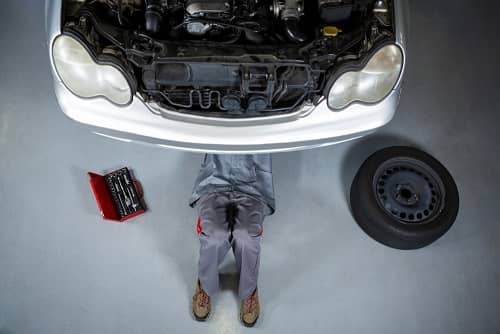

Compliance
Buying or selling a GEO with an open recall can mean the car isn’t meeting federal safety standards yet. That can create paperwork delays, make insurance or financing harder, and weaken resale until the repair is done. Check first, fix fast, and keep the record; your ownership stays simple.
Avoid Out-of-Pocket Repair Bills
Why pay for a repair that may have been covered? Checking recalls before you buy or sell a classic GEO can save real money and strengthen your records for resale. Use our GEO Recall Check (we can also decode shorter, pre-17-character VINs) to see what was announced, what was fixed, and what to ask a GM/Chevy dealer about next.

How to Run GEO Recalls
Discovering your GEO recall report is just a minute away! Follow these easy steps to get the information you need quickly and effortlessly:

Find your GEO VIN
You'll need your Vehicle Identification Number (VIN) ready. Look on the driver’s side dashboard (through the windshield) or the driver’s door jamb. You can also find the VIN on your title, registration, or insurance card. Our lookup works for classic GEO models.


Enter your details
Type your VIN in the form above. No VIN handy? Use your license plate number instead.


Receive Your GEO Recall Report
We’ll show any open GEO recalls immediately, plus key details and next steps. If a recall is listed, book the free repair at an authorized GEO dealer for peace of mind.
What is on the GEO Recall Check?
In your Detailed Vehicle History, the GEO recall check lists any safety recalls tied to your vehicle. Each entry shows the announcement date, the affected component, and the recommended next steps.
Explore the details below for more information:
- Date of recalls: Shows when GEO and NHTSA issued the recall, helping you judge urgency and confirm our data is timely, accurate, and decision-ready.
- Affected Component: Identifies the exact GEO part involved, so you know what’s wrong and can discuss repairs confidently with any dealer or mechanic.
- Remedy: Details the manufacturer’s free fix. You’ll see where to go and what’s covered, reducing hassle and avoiding out-of-pocket surprises.
- Next step for the affected GEO: Confirm if your GEO is listed under the recall and schedule repairs. With a complete Vehicle Report, you’ll also see past recalls and repair status.
A GEO vehicle history report also includes vehicle usage record & ownership history, accident records & salvage info, vehicle summary & details, title brand check, and more.
Review the records for better explanations below:
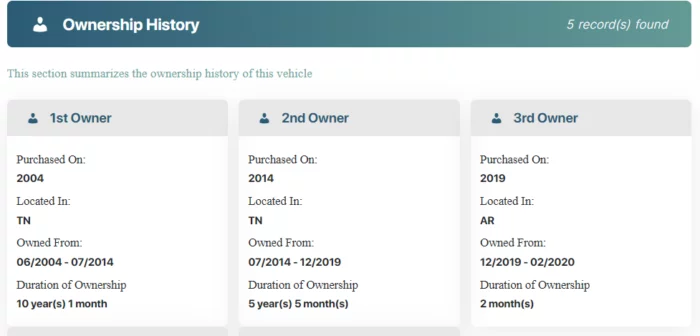
Vehicle Usage Record & Ownership History
We outline prior registrations and use types (personal, fleet, rental) to help you judge wear and tear. For GEO, this context matters—many lived tough, practical lives.
Accident Records & Salvage Info
Crash and damage entries, including total-loss or insurance records when available. You’ll see severity notes where provided.

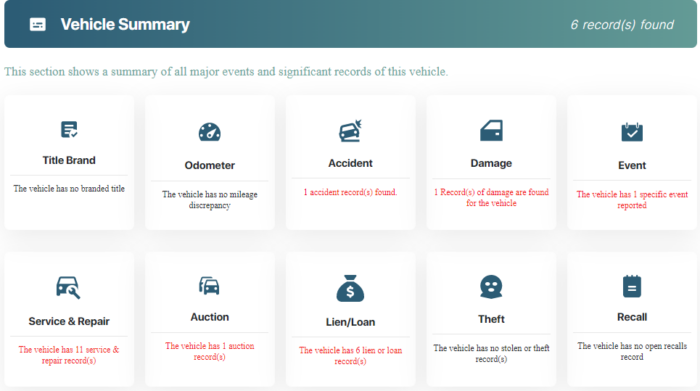
Vehicle Summary & details
A clean snapshot of your GEO’s identity: year, model, trim, engine, factory options, build plant, and decoding of that 17-character VIN. Handy if you’re shopping or verifying what’s actually in the car.
Title Brand Check
We scan for title brands like salvage, rebuilt, flood, lemon, or junk. If a GEO has structural or flood history, you’ll know.
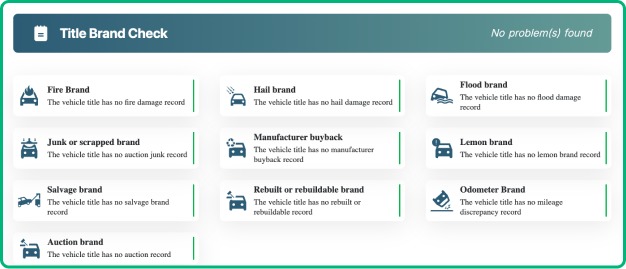
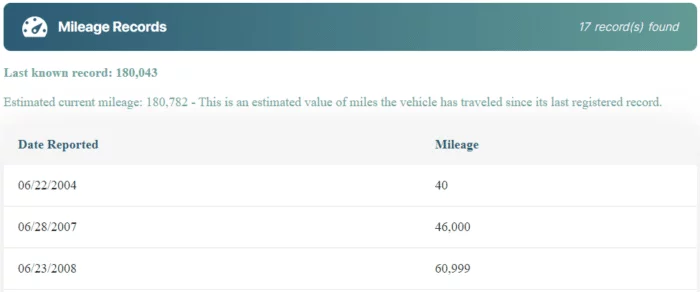
Mileage Records
We chart odometer readings across inspections, sales, and services to spot rollbacks or gaps.
Auction History
If your GEO crossed auction blocks, we surface lane dates and basic run data (and photos when sources permit).
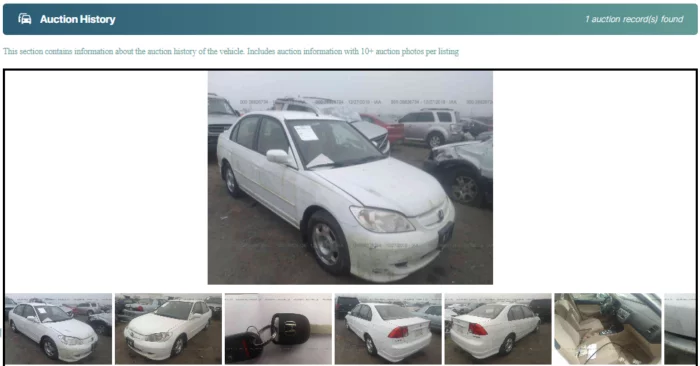
Common Issues Leading to GEO Recall
GEO vehicles have faced several recalls due to safety and reliability concerns. Common issues include the Front Seat-Belt Buckle Buttons Could Break, and more.
When checking for a GEO, several factors come into play. Here’s a breakdown of elements that could affect your GEO and lead to a recall:
Front Seat-Belt Buckle Buttons Could Break
1989–1991 GEO Metro/Storm/Tracker; multi-make campaign
If the red “PRESS” button cracked, fragments could fall into the buckle and stop it from latching or releasing correctly. In a crash, that means the belt might not protect you, clearly dangerous.
The fix was to inspect the buckles and replace affected parts free of charge. This defect was covered under a large, multi-manufacturer campaign; for GEO, it appears as NHTSA Campaign 95V103007 with the core problem described as “front safety belt buckle release buttons can break.”
Rear axle housing welds could fracture
1993–1994 GEO Tracker
Some Trackers left the factory with incorrectly welded rear axle shaft housing tubes. A crack here could let the wheel assembly separate and even tear a brake line, which can mean sudden loss of control and braking. Dealers were instructed to inspect welds and replace the rear axle assembly on affected vehicles. (NHTSA labels this as a 1994 model recall; it also covers certain 1993 models built in the range.)
Fuel-tank puncture risk in rear impacts
A certain 4-door 1996 GEO Tracker
On some 4-door Trackers, a rear floor reinforcement bracket could puncture the fuel tank in a rear collision, not compliant with FMVSS 301 (fuel system integrity). The remedy was to install a protective fuel-tank shield and gussets. Owner notification was expected to begin in July 1996.
Steering wheel lot/date code concern
1994 GEO Tracker
A batch of steering wheels (identified by a specific lot date code) needed to be swapped out. Dealers were told to inspect the wheel’s date code and replace any suspect wheels; owner notification began in June 1996. While the notice doesn’t spell out the failure mode in detail, the action was precautionary to keep the steering system safe.
Understanding the GEO Recall Process
GEO is a discontinued GM brand, but GM/Chevrolet still handles GEO safety recalls. NHTSA (the U.S. safety regulator) collects complaints, opens investigations, and oversees recalls. When a safety defect or a federal‐standards violation is confirmed, the manufacturer must notify owners and provide a remedy.
Repairs are free if the vehicle’s first retail sale was within 15 calendar years of the recall notice; after 15 years, free work isn’t required and may be goodwill.
Also note: NHTSA’s public VIN tool generally shows only unrepaired recalls from the last 15 years, so older GEO campaigns may not appear even though they exist.
Discover the full breakdown of the GEO Recall Process below:
Report the Problem
If your classic GEO shows a safety issue (e.g., loss of control, fire risk, seat-belt failure), file a complaint with NHTSA’s “Report a Safety Problem.” Your report is logged with others and helps the agency spot patterns that can trigger a formal review.
Investigation
NHTSA’s Office of Defects Investigation reviews data from complaints, manufacturer reports, and other sources. If concerns warrant, the agency opens an investigation. Outcomes can include no defect found or a recall being initiated by the manufacturer under NHTSA oversight.
Recalls
When a recall is launched, GM files the details with NHTSA (what’s wrong, which vehicles are affected, the remedy, and the schedule). Owners are notified and repairs are performed by GM/Chevrolet dealers at no charge if the vehicle meets the federal 15-year window. Remedies can be repair, replacement, or refund as allowed by federal law.
What to do with a classic GEO
- Check your VIN (or license plate converted to VIN). Remember: older GEOs may not show in NHTSA’s VIN results due to the 15-year display window.
- Bring documentation to a Chevy/GM dealer. They can confirm campaign status and parts availability.
- Keep records of recall letters and completed repairs—this protects safety and helps future resale.
How GEO Vehicle Recalls Are Handled?
When a safety problem is found on a GEO, three groups work together: the manufacturer, NHTSA, and you, the owner.
This teamwork finds defects, informs drivers, and makes sure fixes are completed to keep your vehicle safe and legal. Below is a detailed breakdown of each role
Manufacturer (GM/Chevrolet for GEO) Role
Even though GEO is discontinued, GM still runs safety recalls for GEO vehicles. When a safety defect or standard violation is identified, GM files details with NHTSA, and Chevy/GM dealers perform the fix. The repair is free if the vehicle’s first retail sale was within 15 calendar years of the recall notice; beyond that, free work is not legally required and may be handled as goodwill.
NHTSA’s Role
The NHTSA sets safety rules, monitors complaints, and oversees recalls. It also hosts the public VIN lookup (useful for quick checks), but that tool shows only unrepaired safety recalls from the last 15 years, so older GEO campaigns may not appear even though they exist.
Your Role as the Vehicle Owner
Your job is simple: check your VIN, read the risk and remedy, then book the repair with a Chevy/GM dealer. Keep records and address info current so notices reach you. If you paid for a repair just before the recall was announced, you may be eligible for reimbursement under the manufacturer’s plan (per federal requirements).
Get GEO Window Sticker by VIN
Upgrade to a GEO Window Sticker by VIN and see the stuff photos miss: factory options, color codes, safety equipment, fuel-economy data, and pricing info. Combined with your recall report, it helps confirm equipment, spot inconsistencies, and tell a truthful story about the car. A small add-on from Detailed Vehicle History that pays off at inspection and negotiation time.

Why Use Detailed Vehicle History to Check GEO Recall?
Shopping for a GEO or getting yours ready to sell? Detailed Vehicle History pairs recall data with the facts buyers ask for: mileage trends, title and theft checks, service notes, prior listings, and auction history. We flag open campaigns, show what was already repaired, and explain the next step with a GM/Chevy dealer.
Because NHTSA’s VIN tool focuses on the last 15 years of unrepaired recalls, our report is a smart complement, especially for older GEOs. Get the context you need to negotiate with confidence.
Recall Check For Others Manufacturers
FAQ about GEO Recalls Check
Do GEO recalls expire?
Recalls themselves don’t “expire,” but free remedies are generally provided for vehicles not more than 15 years old at the time the defect is determined. For older GEOs, many fixes were completed decades ago; use a history report to confirm.
How do I check my GEO for recalls?
Go to Detailed Vehicle History and run a GEO Recall Check using your VIN, or just enter the license plate and state, and we’ll convert it to the VIN for you. We’ll show open and past recalls with the campaign ID, dates, risks, and the official remedy, and we can also decode older short/vintage VINs (fewer than 17 characters) that basic tools don’t accept.
What happens if I ignore a GEO recall?
You’re driving with a known safety risk (think: hood fly-up, axle, or fuel issues). NHTSA urges owners to fix recalls immediately.
Can a dealer sell a used GEO with an open recall?
Yes, in most of the U.S., there’s no federal ban on selling used vehicles with an open safety recall (the ban applies to new vehicles). Some states require disclosure, but rules vary.
Best practice: run a GEO Recall Check with Detailed Vehicle History (VIN or plate; we can also handle short/vintage VINs), confirm what’s open, and ask the seller to schedule the GM/Chevy dealer fix before delivery.
Remember: free safety-recall repairs are guaranteed by law only if the vehicle’s first sale was within 15 years of the recall notice.
Which GEO models had recalls?
Metro (hood latch), Tracker (rear axle welds; fuel tank integrity), Prizm (supplier equipment recalls, plus various safety campaigns), and others. Specifics depend on year/VIN.
Best practice: run a GEO Recall Check with Detailed Vehicle History (VIN or plate; we can also handle short/vintage VINs), confirm what’s open, and ask the seller to schedule the GM/Chevy dealer fix before delivery.
Remember: free safety-recall repairs are guaranteed by law only if the vehicle’s first sale was within 15 years of the recall notice.
How long will the repair take?
Varies by campaign and parts. Dealers are expected to complete recall remedies within a reasonable time; sixty days is frequently cited in dealer guidance.
If my GEO has multiple recalls, can a GM/Chevy dealer complete them in one visit?
Usually, yes. Dealers can bundle campaigns if parts are available and the VIN shows the recalls as open. Call ahead with your VIN so they can check applicability, order parts, and estimate time (some campaigns are quick inspections; others take longer).
Bring a DVH GEO Recall Check so the advisor sees the campaign IDs and dates. If a recall is older than the federal 15-year free-repair window, ask about goodwill, but know it isn’t guaranteed.
Does an open GEO recall hurt resale?
Usually. Buyers (and many dealers) prefer vehicles with all recalls closed. Fixing the recall and documenting it helps value.
Do emissions recalls matter for GEO?
Yes. EPA can require emissions-related recalls; these aren’t about crash safety but can still affect drivability and compliance. Check your VIN and local regulations.
What’s the difference between a GEO safety recall, a service campaign, and a TSB?
- Safety recall: Safety defect or federal-standard failure. GM notifies owners, and a GM/Chevy dealer provides a free remedy (parts/labor) within the federal 15-year window from first sale.
- Service campaign/customer satisfaction: Voluntary program to address non-safety issues (e.g., durability). Time/mileage limits may apply; not recorded by NHTSA like a safety recall.
- TSB (Technical Service Bulletin): Guidance to dealers on diagnosing/repairing known issues. It’s not a recall and doesn’t automatically mean a free repair unless covered by warranty or special policy.

